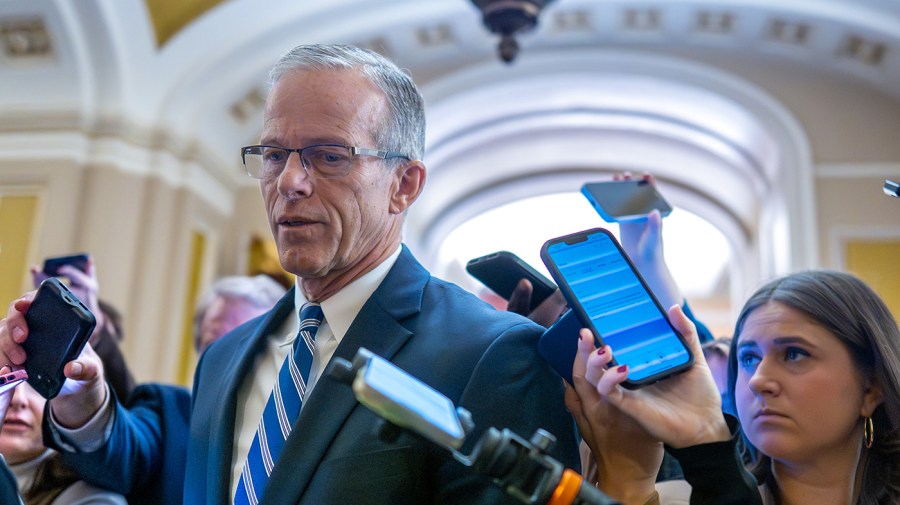Politics
Election Results Worsen Budget Stalemate, Deepen Political Divide

The recent off-year elections have intensified the ongoing budget stalemate in the United States, shifting the political landscape in unexpected ways. Following the elections held on November 4, 2023, which saw significant Democratic victories, lawmakers now face a deeper divide over funding negotiations. Instead of paving the way for bipartisan discussions, the results have empowered Democrats to take a firmer stance on including health care subsidies in any potential budget agreement.
Before the elections, both parties expressed cautious optimism about resolving the budget impasse. Centrist senators were reportedly engaged in discussions to reach a compromise. However, the outcome of the elections has led to a pronounced shift. Democrats, buoyed by their recent successes, have adopted a more uncompromising approach, with demands for health care provisions becoming non-negotiable.
Republican lawmakers have responded by refusing to discuss health care or any other issues until the government reopens. President Donald Trump has further complicated matters by dismissing invitations for bipartisan talks and promoting a controversial strategy among GOP senators to eliminate the Senate filibuster—a move that even many Republicans oppose. This escalating tension has stalled any progress, with the previously discussed Senate deal collapsing shortly after the elections.
The breakdown became evident after a Democratic lunch meeting on November 9, 2023, where centrist members expressed that they were far from a consensus. Senate Majority Leader John Thune criticized liberal Democrats for using the election results to pressure their moderate counterparts. “All I know is that the pep rally they had at lunch yesterday evidently changed some minds,” Thune remarked, noting the shift in momentum that hindered the negotiations.
Before the elections, political analysts had speculated that the results could provide leverage to ease the partisan deadlock. One Democratic strategist indicated that the electoral outcomes would influence negotiations, suggesting that the dynamics of resistance would shift. Instead, the results have emboldened Democratic leaders to double down on their demands, with House Minority Leader Hakeem Jeffries characterizing the election as a “decisive repudiation of Donald Trump and failed Republican policies.”
In response, Senate Minority Leader Chuck Schumer announced a series of specific provisions that Democrats would like included in any budget agreement. These proposals involve a one-year extension of expiring Affordable Care Act (ACA) subsidies, a significant concession from Democrats who previously sought a permanent extension. “Democrats have said we must address the health care crisis, but Republicans have repeatedly said they won’t negotiate to lower health care costs until the government reopens,” Schumer stated on the Senate floor.
Despite this concession, Republican leaders promptly dismissed Schumer’s proposal, insisting that negotiations on health care would only commence once the government is operational. “Everybody who follows this knows that’s a nonstarter,” Thune reiterated, emphasizing that the ACA extension would be part of future negotiations, contingent on the government’s reopening.
As the stalemate continues, Democrats remain resolute in their position, with Representative Pete Aguilar emphasizing that their stance has not changed. The recent electoral outcomes have provided them with renewed motivation and pressure from their liberal base to maintain their demands.
The elections, which historically have seen the president’s party struggle, yielded unexpected results for Democrats. In Virginia, former Representative Abigail Spanberger won the governor’s race by a significant margin of 15 points, while in New Jersey, current Representative Mikie Sherrill achieved a 13-point victory. Additionally, California voters decisively supported measures to redraw the state’s congressional map, reflecting a strategic response to Republican-led redistricting efforts.
Despite the Democrats’ electoral success, Republican leaders have sought to downplay the significance of these results, asserting that they do not foreshadow outcomes for next year’s midterm elections. House Speaker Mike Johnson remarked, “What happened last night was blue states and blue cities voted blue,” framing the results as predictable.
Democrats have consistently called for new discussions to reach a budget compromise that would include efforts to prevent enhanced ACA subsidies from expiring. However, proposals for negotiation have been met with resistance from GOP leaders, who assert that their current stopgap plan is a “clean” bill that maintains existing spending levels.
Last week, Schumer and Jeffries reached out to Trump for another meeting to discuss the budget impasse, but their requests went unanswered. Historical context suggests that Trump’s engagement may be vital for resolving the standoff. Lawmakers across the political spectrum recognize that his involvement could be crucial, as was evident during the 2019 shutdown.
Jeffries emphasized the need for Trump to re-enter the negotiations, stating, “He needs to get off the sidelines and get in the game. Because until he does, this government will remain shut down.” With the budget impasse now entering its 40th day, the political divisions appear as stark as ever, with little indication of a path forward.
-

 Top Stories1 month ago
Top Stories1 month agoRachel Campos-Duffy Exits FOX Noticias; Andrea Linares Steps In
-

 Top Stories1 week ago
Top Stories1 week agoPiper Rockelle Shatters Record with $2.3M First Day on OnlyFans
-

 Top Stories6 days ago
Top Stories6 days agoMeta’s 2026 AI Policy Sparks Outrage Over Privacy Concerns
-

 Sports5 days ago
Sports5 days agoLeon Goretzka Considers Barcelona Move as Transfer Window Approaches
-

 Top Stories1 week ago
Top Stories1 week agoUrgent Update: Denver Fire Forces Mass Evacuations, 100+ Firefighters Battling Blaze
-

 Top Stories1 week ago
Top Stories1 week agoOnlyFans Creator Lily Phillips Reconnects with Faith in Rebaptism
-

 Top Stories5 days ago
Top Stories5 days agoWarnock Joins Buddhist Monks on Urgent 2,300-Mile Peace Walk
-

 Entertainment6 days ago
Entertainment6 days agoTom Brady Signals Disinterest in Alix Earle Over Privacy Concerns
-

 Top Stories1 week ago
Top Stories1 week agoOregon Pilot and Three Niece Die in Arizona Helicopter Crash
-

 Top Stories4 days ago
Top Stories4 days agoCBS Officially Renames Yellowstone Spin-off to Marshals
-

 Health2 months ago
Health2 months agoTerry Bradshaw Updates Fans on Health After Absence from FOX NFL Sunday
-

 Sports4 days ago
Sports4 days agoSouth Carolina Faces Arkansas in Key Women’s Basketball Clash



